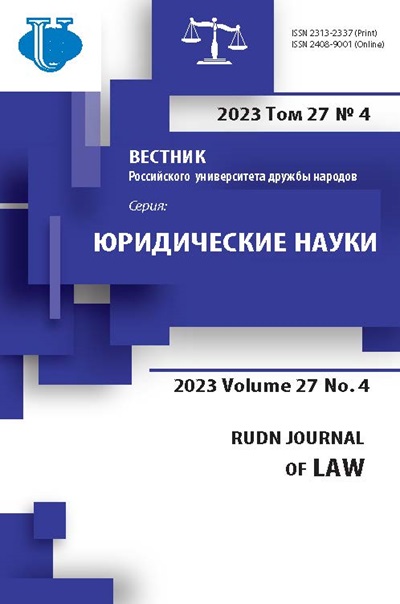The rule of law in the UK: essence and approaches to determination
- Authors: Shevchenko M.I.1
-
Affiliations:
- RUDN University
- Issue: Vol 27, No 4 (2023)
- Pages: 871-885
- Section: STATE AND LAW IN CONTEMPORARY WORLD
- URL: https://journals.rudn.ru/law/article/view/36892
- DOI: https://doi.org/10.22363/2313-2337-2023-27-4-871-885
- EDN: https://elibrary.ru/HECBQZ
- ID: 36892
Cite item
Full Text
Abstract
The research is focused on the essence of the rule of law as a constitutional and legal principle as the basis of the UK constitution and approaches to its determination. The rule of law, being a general legal principle, which has been developed in various legal concepts, including the British rule of law, the German rechtsstaat, the French etat de droit, at the present stage has become one of the fundamental constitutional and legal characteristics, both at the national and supranational level. National concepts of the rule of law, having certain differences and peculiarities, are essentially aimed at achieving similar goals. However, their substantive content is formed on the basis of existing features of specific national legal orders. One of the earliest and most developed in terms of constitutional and legal theory and practice is the UK approach to the rule of law. However, the question of its determining remains relevant at the present stage. The object is the concept of the rule of law developed in the UK, the subject is its specific features and manifestations, as well as approaches to its determination in British legal doctrine and practice. The purpose is to explore the issue of determination of the rule of law in the UK and to form a comprehensive approach to understanding its essence. The methodological basis of the research is constituted by 1) dialectical method, 2) general scientific methods including analysis, synthesis, comparison, analogy, deduction and induction, 3) special methods including logical, formal-legal, comparative-legal, and statistical methods. Based on the analysis the author makes an attempt to define the essence of the rule of law as an integral part of the UK constitution and its key features.
About the authors
Maxim I. Shevchenko
RUDN University
Author for correspondence.
Email: m.sh.1997@yandex.ru
ORCID iD: 0000-0002-5682-5525
postgraduate student of the Department of Constitutional Law and Constitutional Procedure, Law Institute
6 Miklukho-Maklaya str., Moscow, 117198, Russia FederationReferences
- Aristotle (2009) The politics of Aristotle: a treatise on government. Transl. by William Ellis. The Floating press.
- Barenboim, P. (2013) Interrelationship between the rule of law and legal state doctrines as the main question for philosophy of law and constitutionalism. Moscow, LUM Publ., (in Russian).
- Bingham, T. (2011) The Rule of Law. London, Penguin UK.
- Bradley, A.W. & Ewing, K.D. (2007) Constitutional and administrative law. 14th ed. London, Pearson education.
- Carothers, T. (2003) Promoting the rule of law abroad. Carnegie endowment for international peace. Rule of law series. https://doi.org/10.2307/j.ctt6wpk74
- Chirkin, V.E. (2015) Supremacy of law: contemporary terminology. Journal of Russian Law. 12(228),5-11. doi: https://doi.org/10.12737/16624. (in Russian).
- Craig, P. (2017) Formal and substantive conceptions of the rule of law: an analytical framework. In: Bellamy, R. (ed.). The rule of law and the separation of powers. 1st ed. London, Routledge. https://doi.org/10.4324/9781315085302
- Dicey, A.V. (1907) Introduction to the study of the law of the constitution. Saint Petersburg, L.F. Panteleev Publ. (in Russian).
- Hayek, F.A. (1960) The constitution of liberty. London, Routledge.
- Loughlin, M. (2010) Foundations of public law. New York, Oxford University press. https://doi.org/10.1093/acprof:oso/9780199256853.001.0001.
- Lovett, F. (2016) A republic of law. New York, Cambridge University press. https://doi.org/10.1017/CBO9781316440698.
- McGarry, J. (2014) Course notes: constitutional and administrative law. London, Routledge.
- Meierhenrich, J., & Loughlin, M. (2021). Thinking about the Rule of Law. In: Meierhenrich, J.& Loughlin, M. (eds.). The Cambridge Companion to the Rule of Law. Cambridge Companions to Law, pp. 3-22. Cambridge, Cambridge University press. https://doi.org/10.1017/9781108600569.001
- Mikhailov, A.M. (2022) The doctrine of the rule of law: a classical interpretation of A.V. Dicey and legal positivism. The law and practice. (4), 5-23. https://doi.org/10.24412/2411-2275-2022-4-5-23 (in Russian).
- Montesquieu, Ch.L. (1900) On the spirit of the laws, or the way in which the laws should stand in relation to the organisation of each government, to manners, climate, religion, commerce, etc. Saint Petersburg, L.F. Panteleev Publ. (in Russian).
- Raz, J. (1979) The authority of law: essay on law and morality. New York, Oxford University press.
- Rutherford, S. (1644) Lex, rex: the law and the prince, a dispute for the just prerogative of king and people, containing the reasons and causes of the defensive wars of the kingdom of Scotland, and of their expedition for the ayd and help of their brethren of England. Available at: https://archive.org/details/lexrexlawandpri00maxwgoog [Accessed 30th March 2023].
- Sajó, A. & Uitz, R. (2017) The constitution of freedom: An introduction to legal constitutionalism. New York, Oxford University press. https://doi.org/10.1093/oso/9780198732174.001.0001.
- Shevchenko, M.I. (2023) Reform of the Human Rights Act 1998 in UK: How will the balance of private and public interests change? Legal policy and legal life. (1), 255-265. https://doi.org/10.24412/1608-8794-2023-1-255-265 (in Russian).
- Steyn, L. (1999) The Constitutionalisation of public law. Constitution unit. Available at: https://www.ucl.ac.uk/constitution-unit/sites/constitution_unit/files/38_0.pdf [Accessed 30th March 2023].
- Tamanaha, B.Z. (2004) On the rule of law: history, politics, theory. Cambridge, Cambridge University press. https://doi.org/10.1017/CBO9780511812378
- Walters, M.D. (2020) A.V. Dicey and the common law constitutional tradition: a legal turn of mind. Cambridge, Cambridge University press. https://doi.org/10.1017/9781139236249
- Zorkin, V.D. & Barenboim, P.D. (eds.). (2013) The legal state and the rule of law doctrines in modern world. Moscow, Yustitsinform Publ. (in Russian).
Supplementary files















